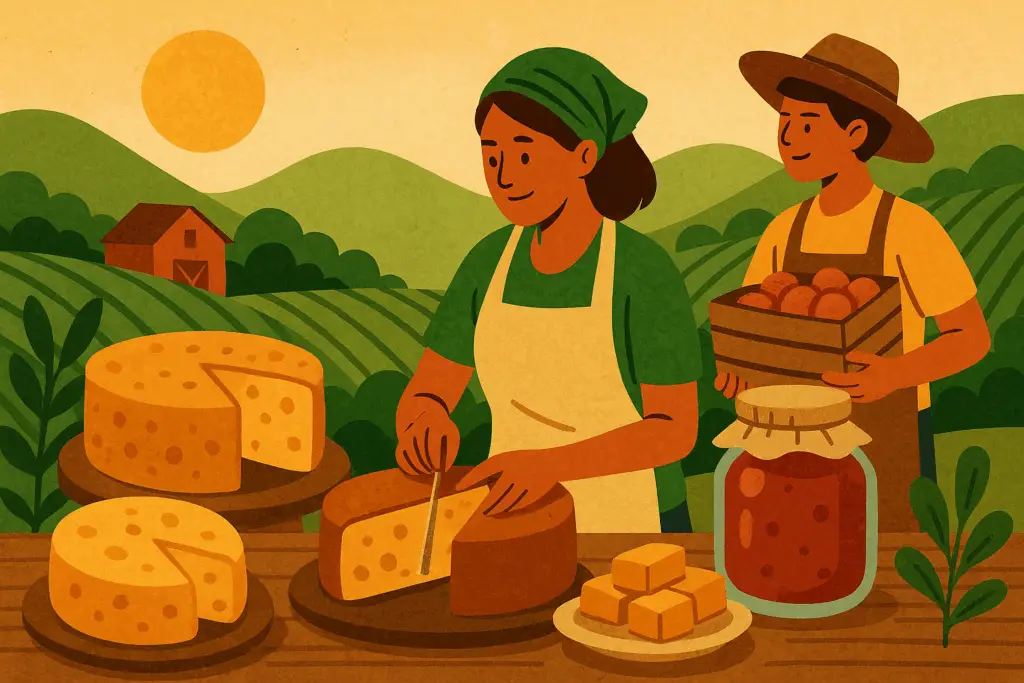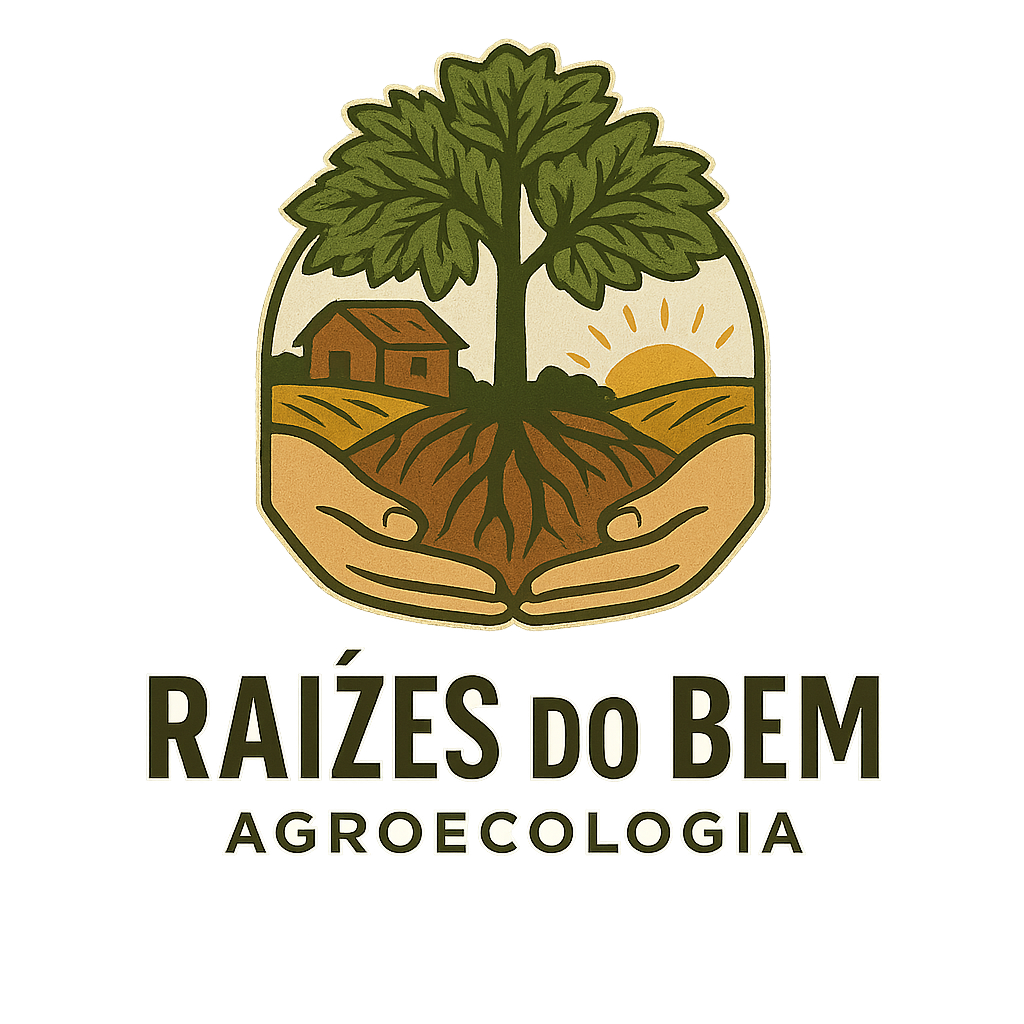
From Farm to Table: Behind the Scenes of Cheese and Sweets Production at Raízes do Bem Agroecologia
The production of cheese and sweets at the “Raízes do Bem” initiative illustrates a deep connection between family farming and community empowerment, reflecting sustainable practices that go beyond mere food production. This article explores the behind-the-scenes of this production, sharing the stories of producers working within this model, exploring their techniques, and the social realities that surround their activities.
According to IBGE data (2020), Brazilian agricultural production reached 968.7 million tons in 2019, placing the country among the world’s leading food producers (Shimada et al., 2021). However, this growth is not evenly reflected across all sectors, particularly in the artisanal production of cheese and sweets within family farming contexts. Family farming plays a vital role not only in promoting food security but also in preserving local culture and strengthening regional identity. Products like traditional Minas artisanal cheese are directly influenced by animal feeding and farm management practices, which in turn affect the sensory characteristics of the products throughout the year (Figueiredo et al., 2015).
At “Raízes do Bem,” the behind-the-scenes journey begins with the careful selection of raw materials. Milk, for instance, must be handled under rigorous hygienic conditions to ensure the quality of the final products. A study conducted in dairy farms in Rio Grande do Sul demonstrated that proper hygiene in the production process is crucial for the microbiological quality of milk (Nogara et al., 2022). To ensure that the cheeses produced are both delicious and safe, the application of appropriate conservation and processing techniques is also essential. The use of essential oils in cheese preservation, as discussed in recent research, can help extend shelf life while maintaining quality and flavor (Coutinho et al., 2020).
Life stories, like that of farmer Antônio, who inherited the family tradition of fruit preserve making, illustrate the connection between past and present. These practices are not only a means of livelihood but also a way to connect new generations with their cultural roots. Producing seasonal fruit preserves requires ancestral knowledge passed down through generations. These stories humanize production, create an emotional connection with consumers, and highlight the importance of traditional cultivation and manufacturing methods.
Furthermore, the pursuit of sustainability and environmental preservation is a hallmark of production at “Raízes do Bem.” Sustainable practices span from cultivation in the fields to resource management in artisanal processing. Cheese production, for example, stands out not only for product quality but also for how the milk is collected and processed, focusing on Good Manufacturing Practices (GMP) to prevent contamination (Oliveira, 2022).
Artisanal production also faces significant challenges, such as formalization and regulation that often exclude small producers from market dynamics. However, initiatives that promote the value of artisanal work and regional products are gaining ground. For instance, Coalho cheese is now recognized as a functional food due to the presence of bioactive peptides, exemplifying how traditional products are being revalued in contemporary markets (Cavalcante, 2023).
The role of women in artisanal production deserves special attention. Many processes, from milk collection to cheese and sweet production, are carried out by women, who often lead their communities in the pursuit of sustainability and the promotion of local products. Female empowerment in agricultural activities contributes not only to family income but also to the social and economic development of rural regions.
Education and awareness about sustainable and healthy practices are equally important. Disseminating knowledge about how to select, produce, and consume food responsibly benefits producers and improves nutrition and food security in the communities involved. Several studies show that sanitary education and proper handling are essential to improving product quality and public health (Nogara et al., 2022).
“Raízes do Bem” also exemplifies a strategy for promoting and marketing products that aims to strengthen the link between nutrition and community, providing consumers with insight into the origins of the food they consume. This not only adds value to the products but also builds a narrative that includes everyone involved in the production process, from farm to table. Humanizing the production chain raises awareness about the importance of sustainable production and the value of local products.
Ultimately, by bringing artisanal products from farm to table, “Raízes do Bem” offers not only culinary delights but also fosters reflection on best practices in agriculture, the preservation of traditions, and the need for a fairer and more sustainable food system. By supporting small producers and valuing their work, we promote a virtuous cycle that benefits everyone, generating positive impacts on communities and the environment.
References:
- Shimada, B., Simon, M., & Cunha, L. (2021). Food production in agriculture in 2018 and 2019. Brazilian Journal of Development, 7(11), 104039-104045. https://doi.org/10.34117/bjdv7n11-158
- Figueiredo, S., Boari, C., Sobrinho, P., Chaves, A., Silva, R., & Silva, H. (2015). Characteristics of raw milk and Minas artisanal cheese from Serro across different months. Archives of Veterinary Science, 20(1). https://doi.org/10.5380/avs.v20i1.37243
- Nogara, K., Kaelle, G., Tavares, Q., Marcon, T., Gopinger, E., Zopollatto, M., … & Debortoli, E. (2022). Influence of seasons on the microbiological quality of milk from dairy farms in northern Rio Grande do Sul, Brazil. Ciência Animal Brasileira, 23. https://doi.org/10.1590/1809-6891v23e-72795p
- Coutinho, M., Neves, A., Batista, A., & Fontenelle, R. (2020). Use of essential oils in cheese preservation: a review. Revista do Instituto de Laticínios Cândido Tostes, 75(2), 126-141. https://doi.org/10.14295/2238-6416.v75i2.777
- Oliveira, M. (2022). Hygienic-sanitary conditions in the production of artisanal Minas frescal cheese: a review of scientific literature., 143-159. https://doi.org/10.37885/221010645
- Cavalcante, J. (2023). Artisanal Coalho cheese: culture, history, and Northeastern gastronomy. Nutrivisa Revista De Nutrição E Vigilância Em Saúde, 10(1), e10408. https://doi.org/10.59171/nutrivisa-2023v10e10408
© 2025 Raízes do Bem – All rights reserved.
